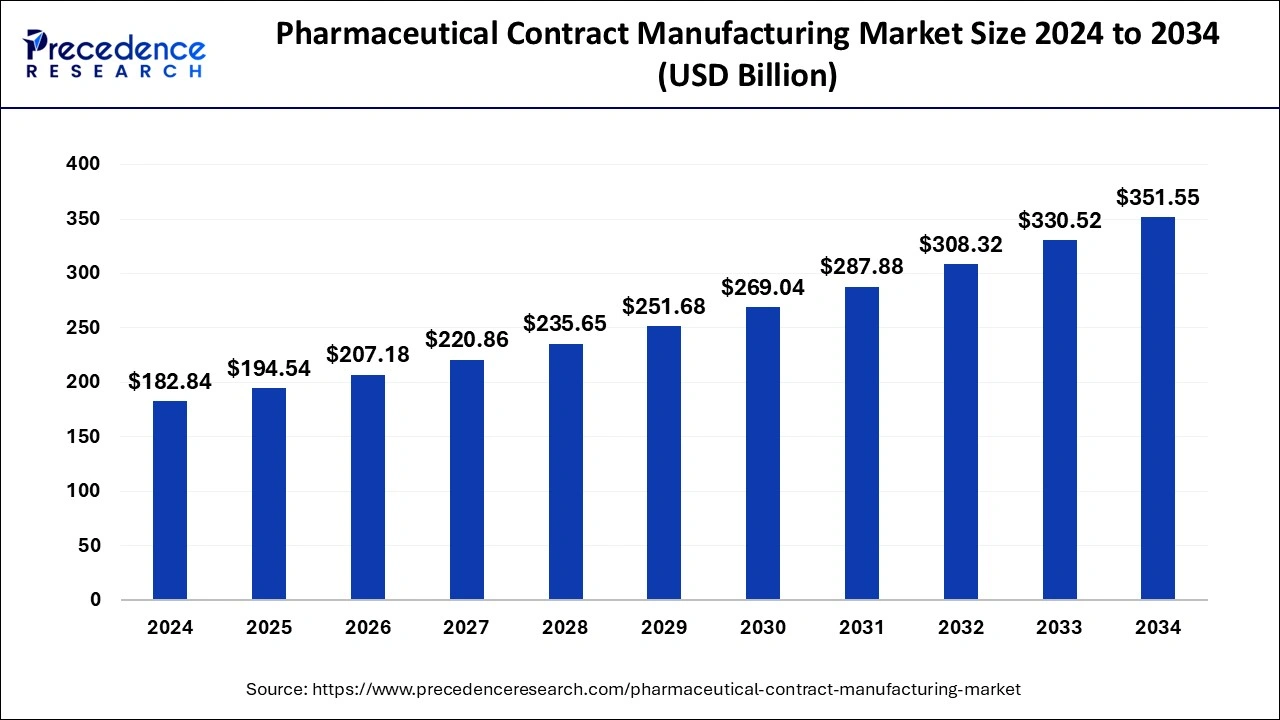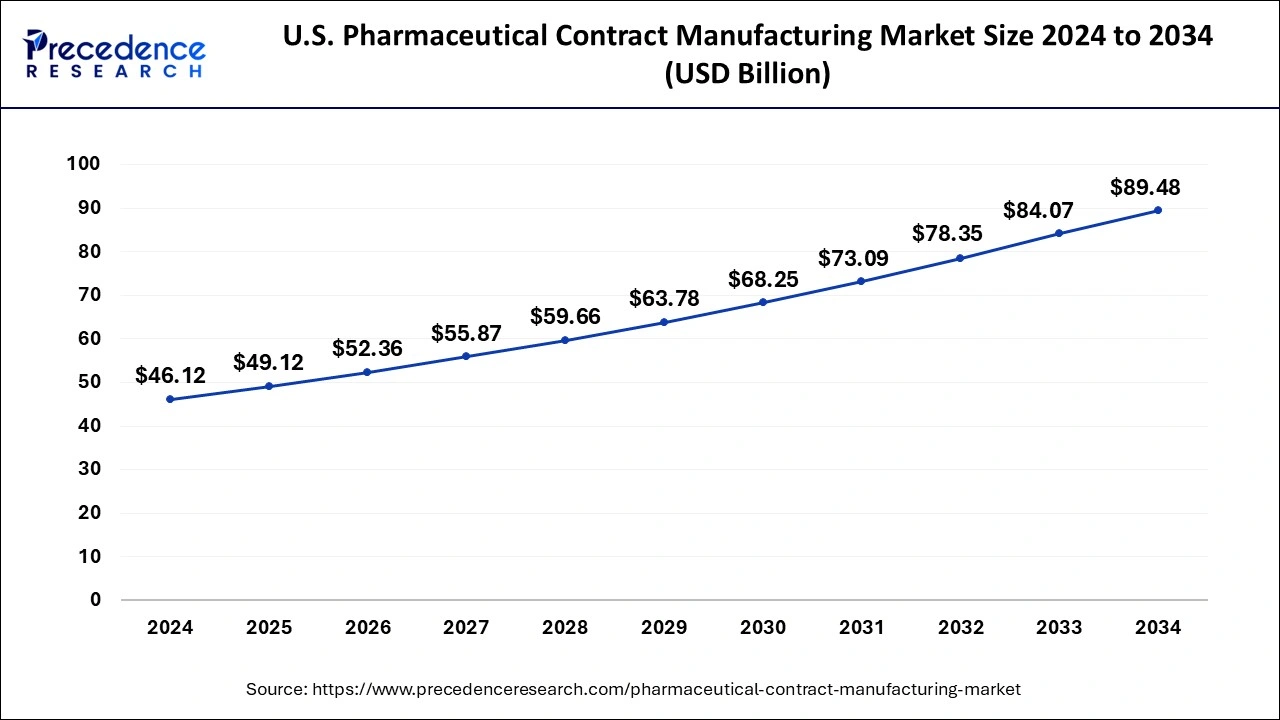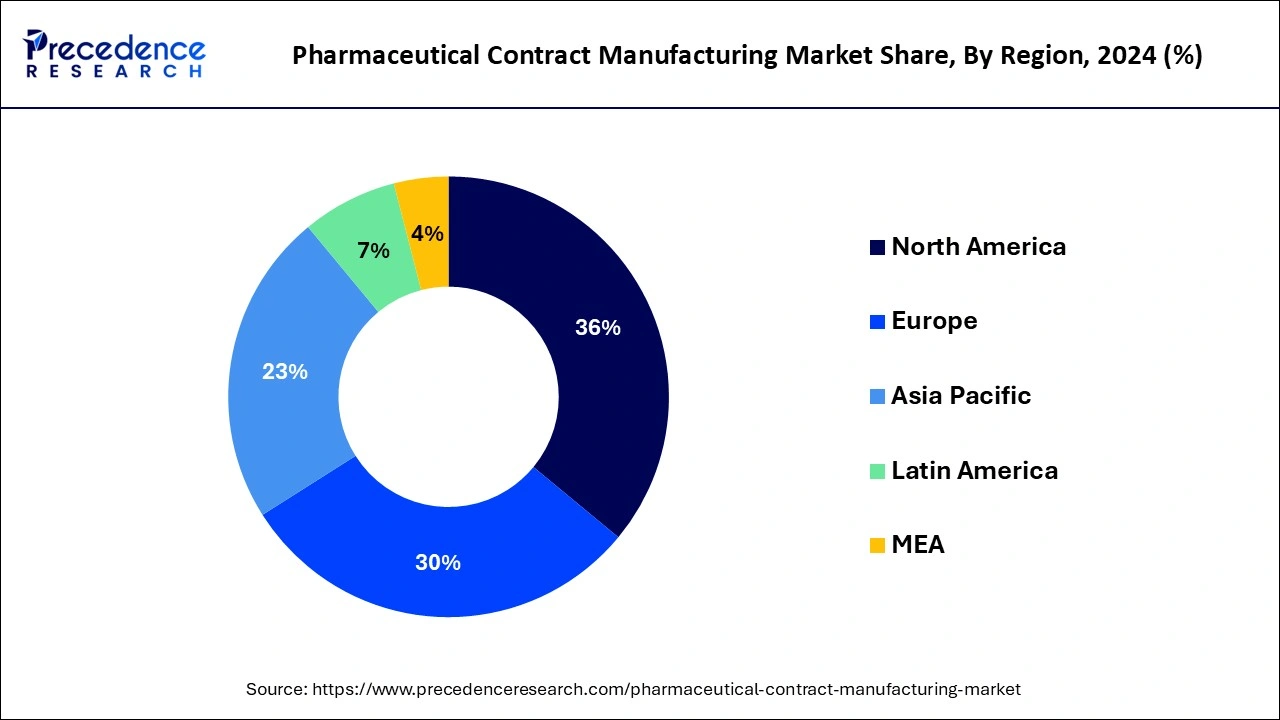May 2024
The global pharmaceutical contract manufacturing market size is calculated at USD 194.54 billion in 2025 and is forecasted to reach around USD 351.55 billion by 2034, accelerating at a CAGR of 6.76% from 2025 to 2034. The North America pharmaceutical contract manufacturing market size surpassed USD 65.82 billion in 2024 and is expanding at a CAGR of 6.80% during the forecast period. The market sizing and forecasts are revenue-based (USD Million/Billion), with 2024 as the base year.
The global pharmaceutical contract manufacturing market size was estimated at USD 182.84 billion in 2024 and is predicted to increase from USD 194.54 billion in 2025 to approximately USD 351.55 billion by 2034, expanding at a CAGR of 6.76% from 2025 to 2034.

The U.S. pharmaceutical contract manufacturing market size was estimated at USD 46.12 billion in 2024 and is anticipated to reach around USD 89.48 billion by 2034, growing at a CAGR of 6.85% from 2025 to 2034.

North America held the largest market share of 36% in 2024 due to its robust pharmaceutical industry, technological advancements, and a high demand for outsourcing. The region's well-established regulatory framework ensures quality and compliance. Additionally, a concentration of major pharmaceutical companies seeking cost-effective and specialized manufacturing services contributes to North America's dominance. The presence of skilled workforce, advanced infrastructure, and a favorable business environment further solidify the region's position as a key player in the pharmaceutical contract manufacturing market.

Asia-Pacific is poised for rapid growth in the pharmaceutical contract manufacturing market due to its cost-effective manufacturing capabilities, skilled workforce, and regulatory compliance. Many pharmaceutical companies are leveraging the region's infrastructure and expertise for outsourced manufacturing. The increasing demand for generic drugs, and biopharmaceuticals, and the globalization of pharmaceutical supply chains contribute to the region's prominence. As a hub for contract manufacturing services, Asia-Pacific offers a competitive advantage, attracting pharmaceutical firms seeking efficient and scalable production solutions.
Meanwhile, Europe is experiencing significant growth in the pharmaceutical contract manufacturing market due to several factors. The region is home to established contract manufacturers with advanced infrastructure and expertise. Increased outsourcing by pharmaceutical companies to streamline production and control costs, coupled with a focus on biopharmaceuticals and advanced manufacturing technologies, contributes to this growth. Additionally, the globalization of the pharmaceutical industry and the need for flexible, regulatory-compliant manufacturing solutions further drive the expansion of contract manufacturing services in Europe.
Pharmaceutical contract manufacturing market offers a collaborative arrangement where a pharmaceutical company outsources the production of drugs or medical products to a specialized third-party manufacturer. Instead of handling the entire manufacturing process in-house, the company entrusts certain or all aspects of production to a contract manufacturing organization (CMO). This outsourcing model allows pharmaceutical companies to benefit from the expertise, infrastructure, and efficiency of CMOs, often leading to cost savings and quicker production timelines.
Contract manufacturers may offer services ranging from drug formulation and development to actual production, packaging, and quality control. This approach enables pharmaceutical companies to focus on research, marketing, and other core activities, while leveraging external manufacturing capabilities for efficient and scalable production of their products.
| Report Coverage | Details |
| Growth Rate from 2025 to 2034 | CAGR of 6.76% |
| Market Size in 2025 | USD 194.54 Billion |
| Market Size by 2034 | USD 351.55 Billion |
| Base Year | 2024 |
| Forecast Period | 2025 to 2034 |
| Segments Covered | By Service and By End User |
| Regions Covered | North America, Europe, Asia-Pacific, Latin America, and Middle East & Africa |
Globalization of the pharmaceutical industry
The globalization of the pharmaceutical industry has significantly boosted the demand for pharmaceutical contract manufacturing. As pharmaceutical markets expand globally, companies seek to tap into diverse regions and benefit from cost-effective manufacturing locations while promoting the growth of pharmaceutical contract manufacturing market. This trend is driven by the need to comply with varying regulatory standards across different countries and gain access to new markets. Contract manufacturing enables pharmaceutical companies to overcome logistical challenges associated with international production by partnering with manufacturers with established facilities in strategic locations.
Moreover, the globalization trend fosters collaborations between pharmaceutical companies and contract manufacturers, allowing for the exchange of expertise and the efficient utilization of resources. By leveraging the capabilities of contract manufacturers worldwide, pharmaceutical companies can navigate the complexities of international markets, accelerate time-to-market, and ensure a more streamlined and cost-effective approach to meet the growing demands of a globalized pharmaceutical landscape.
Dependency on contract manufacturers
Dependency on contract manufacturers serves as a notable restraint in the pharmaceutical contract manufacturing market. Overreliance on external partners can create vulnerabilities for pharmaceutical companies. Issues like capacity constraints, financial stability concerns, or disruptions in the supply chain of contract manufacturers may impact the timely and reliable production of pharmaceutical products. This dependency exposes pharmaceutical companies to potential risks, as any challenges faced by the contract manufacturer can directly affect the availability and delivery of essential medications, potentially leading to delays in product launches and market distribution.
Moreover, a high level of dependence limits the flexibility of pharmaceutical companies to swiftly adapt to market changes or unforeseen circumstances. Companies may face challenges in managing and mitigating risks associated with external manufacturing partners, necessitating careful strategic planning to ensure a resilient and responsive supply chain in the pharmaceutical contract manufacturing landscape.
Advanced manufacturing technologies
Advanced manufacturing technologies are opening new avenues in the pharmaceutical contract manufacturing market, creating opportunities for enhanced efficiency and innovation. The adoption of cutting-edge processes, such as continuous manufacturing and digitalization, allows contract manufacturers to optimize production, reduce costs, and improve overall manufacturing agility. Companies investing in these technologies position themselves as attractive partners for pharmaceutical firms seeking modern and streamlined manufacturing solutions.
Moreover, advanced manufacturing technologies enable contract manufacturers to offer flexibility in production, adapting quickly to changing market demands. The implementation of innovative techniques enhances the precision of drug manufacturing, ensuring higher quality standards. As the pharmaceutical industry continues to evolve, contract manufacturers embracing advanced technologies can not only meet the industry's current demands but also stay at the forefront of future developments, making them key players in the dynamic landscape of pharmaceutical contract manufacturing.
The pharmaceutical manufacturing services segment held the highest market share of 33% in 2024. Pharmaceutical manufacturing services in the contract manufacturing market encompass the production and processing of pharmaceutical products by external service providers. This segment includes drug formulation, development, and manufacturing, allowing pharmaceutical companies to outsource these critical processes. A growing trend in this segment involves increased demand for specialized services, such as biopharmaceutical manufacturing and advanced drug delivery systems. Contract manufacturers offering flexibility, scalability, and expertise in these areas are witnessing heightened demand, reflecting the industry's evolution towards more complex and innovative pharmaceutical products.
The drug development services segment is anticipated to witness rapid growth at a significant CAGR of 8.9% during the projected period. In the pharmaceutical contract manufacturing market, the drug development services segment encompasses a range of services provided by contract manufacturers to assist pharmaceutical companies in the development of new drugs. This includes activities such as formulation development, process optimization, and pre-clinical and clinical trial support. A notable trend in this segment is an increasing demand for integrated drug development services, where contract manufacturers collaborate closely with pharmaceutical companies from early development stages, offering comprehensive solutions to accelerate the drug development process and enhance overall efficiency.
The big pharmaceutical companies segment held a 42% market share in 2024. The big pharmaceutical companies segment in the pharmaceutical contract manufacturing market refers to major drug manufacturers outsourcing their production to specialized contract manufacturing organizations (CMOs). This segment is characterized by prominent players seeking cost-effective and efficient manufacturing solutions.
A notable trend in this segment involves strategic collaborations between big pharmaceutical companies and CMOs to leverage external expertise and facilities, enabling the former to focus on core competencies like research and development while ensuring timely and scalable production through outsourcing. This trend fosters innovation and flexibility in the dynamic pharmaceutical contract manufacturing landscape.
The small & mid-sized pharmaceutical companies segment is anticipated to witness rapid growth over the projected period. The small and mid-sized pharmaceutical companies segment in the pharmaceutical contract manufacturing market includes businesses with relatively modest production capacities. A growing trend within this segment involves these companies increasingly outsourcing manufacturing processes to specialized contract manufacturers.
This allows smaller pharmaceutical firms to leverage the expertise and infrastructure of contract manufacturers, focusing their resources on research, development, and market expansion. The trend reflects a strategic shift among smaller players, emphasizing cost-effective and flexible manufacturing solutions provided by contract manufacturing partners.
By Service
By End User
By Geography
For inquiries regarding discounts, bulk purchases, or customization requests, please contact us at sales@precedenceresearch.com
No cookie-cutter, only authentic analysis – take the 1st step to become a Precedence Research client
May 2024
April 2025
February 2025
September 2024